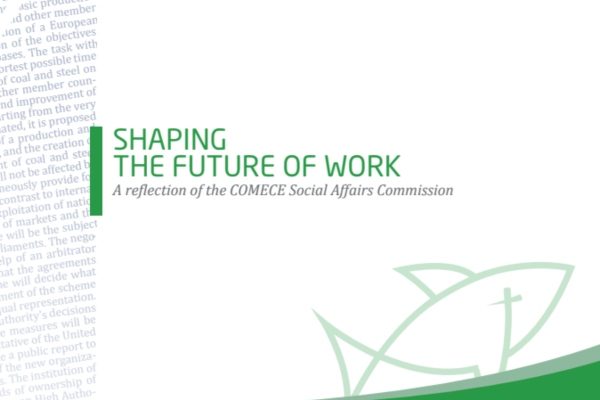COMECE: Shaping the Future of Work (11 December 2018, Europe)

Shaping the Future of Work: A reflection of the COMECE Social Affairs Commission
Shaping the digital as well as the ecological transformation of our economy will be a common challenge for European politics. Both trends will transform the world of work, changing our understanding as well as the labour conditions in Europe, and will require the political will and vision to shape the new world of work.
As the on-going transition will deeply transform our societies, the reflection of the Commission of the Bishops’ Conferences in the European Union (COMECE) encourages the EU institutions to work on a common European vision as to ensure that everybody, as well as the society as a whole, will benefit from these changes. The document elaborated by the COMECE Social Affairs Commission in close consultation with Catholic-inspired organisations in Europe, aims to contribute both to the debate of the next EU mandate as well as to the future of work centenary initiative of the International Labour Organisation (ILO).
The contribution is divided into four sections: it first provides a reflection of work, defining it not only as a source of income but as an integral part of human identity. Work can help people to find their place in society, to foster their personal development and to care for creation by making the common house more fruitful for the next generations.
Much beyond its financial aspect, work therefore has an important role to play in people’s life, and the future world of work has the potential to promote decent employment in Europe. However, the analysis in the second chapter highlights also some of the challenges that are undermining the potential of work as contributor to the common good:
Job polarisation is increasing in a number of EU Member States as digitalisation and automatisation have created many work opportunities for high-skilled people while putting the routine-task jobs of the middle class at risk.
New, more flexible forms of employment challenge EU labour law and threaten job security of mostly young people, who are left to provide their own social security, health and personal protection.
The line between professional and private life has gradually become blurred: the spread and use of new technologies has increased autonomy, but for many it has also led to an intensification of work, shrinking the space for life in family and society.
Based on this analysis, the COMECE reflection proposes to shape the current trends towards a decent, sustainable and participative world of work for all. Such a vision should build on an economy that serves the integral human development and combines the following characteristics:
This world of work will be decent if it promotes just working conditions, including a dignified family-oriented income and sufficient space for life in family and society.
This world of work will be sustainable if it provides the conditions for a stable and fruitful life of the present and future generations taking into account the ecological dimension of work.
This world of work will be participative if workers and employers can shape together at all levels the conditions of their employment through social dialogue and cooperate in tripartite partnership with the state on the formulation of policies that affect their work.
This world of work will be inclusive if it is centred around the primary goal of full employment and enables every member to take part in society and become a free actor for the authentic development of the society.

